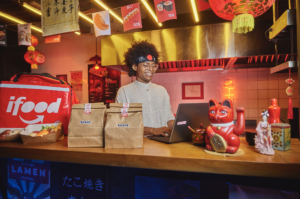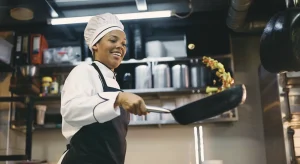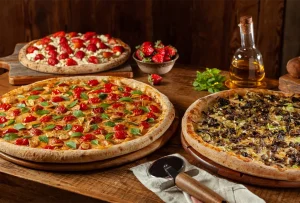Who said that only those who enjoy cooking can do well in food? João Barcelos, who many people know as João do Delivery, has already had four successful businesses in this area and confesses: “Honestly, I have never been a fan of cooking. My business has always been selling. What motivates me is seeing other entrepreneurs transforming their lives through iFood.”
João's story begins in the early 2000s, in the east zone of São Paulo. To provide strength at home, as a boy he started collecting materials for a scrapyard. “My father didn’t receive his salary for a few months, so I wanted to help. But I got a taste for making money, paying the bills”, he recalls.
After that, he started buying things to resell, such as hand cleaning paste, calculator, clothes, sneakers (the last two he even picked up in China to have a better profit margin).
Until one day João noticed huge queues on the beach on a trip to Florianópolis (SC). They were Mexican paddles, a type of ice cream that had just arrived in Brazil. “I smelled the money. When I returned to São Paulo, I researched, found the supplier and wanted to set up a Mexican palette store.”
With a friend, he opened the ice cream shop in 2014. “In the first month, we sold R$ 80 thousand. There was a line, the photo went viral”, says João. The partner's family wanted to get into the business and he agreed. “In three months we set up a factory to sell wholesale, but I never even set foot in it. The family took me out of the business.
As I didn’t have my name on anything, I was forced to leave, it was the biggest mess.”
After that, João tried to open another store in São Paulo, but it closed within nine months because the operation was not paying for itself. He tried to take the business to Praia Grande (SP), but closed the business within five months for the same reason.
From crafts to delivery
The setbacks did not discourage João. Aware of opportunities, he met a boy who sold handicrafts and made a toy that made big soap bubbles. "I was delighted. I thought: 'this sells'. I took my last money and started reselling the toys. It sold a lot.”
One day, a store salesman spotted him and struck up a conversation. “He liked the toy, praised my sales skills and asked me what I was doing there, selling handicrafts on the beach. And he gave me some advice: go back to São Paulo, as I wouldn’t make any money there.”
Back in the capital, his uncle recommended him to work as a salesman for a health food manufacturer. Months later, the delivery manager left and the boss offered João the job. “I didn't understand anything about delivery, but I took it. It was my first contact with iFood, in 2015”, he says.
On a daily basis, he learned iFood hacks in practice. “I studied everything, from cover to cover, I sent emails, I discovered the race. In one month, I increased the company's revenue from R$ 80 thousand to R$ 120 thousand. Sales improved a lot”, says João.
Despite this, a few months later he was fired by his boss. While he was thinking about what to do, his wife asked him why he didn't start a delivery, since he had learned so much. João liked the idea, but was a little suspicious.
“My former boss said that iFood was difficult, that it needed to have a system, computer, printer. I thought it wasn’t for me, I didn’t have any of that”, he recalls. “But I met a motorcycle courier who told me about a friend who sold temaki at home without having any of that and I got excited.”
His first food business, Batataria, was born. Inspiration came from above. “One day, I was in church and someone told me that God had sent a message that he was going to take a business out of the ground to bless me and I was going to bless the whole of Brazil”, says João.
He had no idea what it was, but he had a moment watching cartoons with his daughter, the moment he saw a potato sprout from the ground. “My mother-in-law knew how to make stuffed potatoes, I asked her to teach me, I took the MEI [Individual Microentrepreneur] and registered with iFood.”
On the first day, he sold 600 stuffed potatoes. And he started using his knowledge about iFood to help other people around him: neighbors, friends, relatives... “Everyone I advised had results. My sister set up a tapioca shop and made more than R$ 4,000 in the first month. I taught my uncles and the first weekend they sold R$ 1,500. At that time there was only talk of a crisis. And I realized that, if I taught what I knew, I could get a lot of people out of the crisis”, he reveals.
In the meantime, however, João had a disappointment and decided to go live in the United States. He sold the business and everything he had, but ended up losing the money because he was unable to obtain a visa for himself and his family.
The power of transformation
When he started his life again, he started selling stuffed potatoes again. Little by little, he recovered and opened new businesses. Realizing that there weren't many options for northeastern food on iFood, he created a store specializing in baião-de-dois. Afterwards, he opened a salad bar and a fruit and vegetable store. “I sold a lot, but I wasn’t happy. It wasn’t what I wanted, I was never a fan of cooking.”
Looking for new paths, João started making videos on how to set up a store for delivery and to sell on iFood and started promoting his online courses on YouTube in 2019. “A lot of people, like me, didn't know that you could set up a store on iFood without having all this structure”, he says. “Everything I know is replicable. It’s not luck, it’s a method.”
His course on how to create a stuffed potato shop went viral in the video of a friend, Leonardo Queiroz — and brought in a thousand students. The Covid-19 pandemic came and, in 2020, entrepreneurs' interest in João's tips soared. “There was a time when I sold R$ 150 thousand in three hours. I had to interrupt because I wouldn’t be able to provide support.”
With his success in digital marketing, João permanently hung up his apron. He passed the Batataria to an aunt, left the salad shop and the produce shop to his father and transformed the baião-de-dois into a microfranchise — and ends 2021 with 80 microfranchisees.
Since 2020, he has been focused on courses and mentoring. There's no shortage of work: throughout 2021, he and his team carried out more than a thousand mentoring sessions and sold 4,500 courses. “Today I feel very happy, especially due to the transformation I see in entrepreneurs”, he declares. “When I experienced the worst moment of my life, it was through iFood that I managed to get out. My aim is to show that what changed my life can change others’ lives too.”


